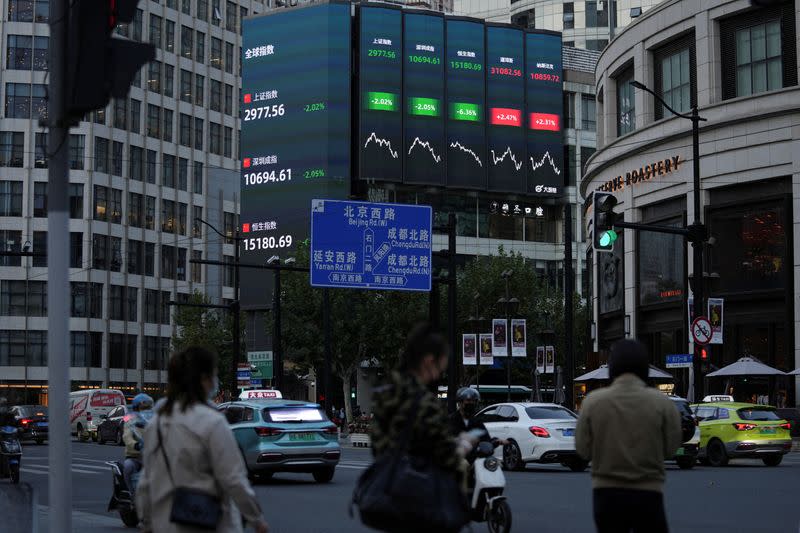An increasing number of global investors are avoiding Chinese stock markets and opting for other emerging markets without geopolitical risks.
There has been a huge jump in the assets of emerging market (EM) mutual funds and exchange traded funds (ETFs) that exclude China, as US and European investors turn more wary of being exposed to the Asian giant.
Investor aversion to China has intensified this year following its faltering post-Covid economic rebound, disappointment over the absence of robust policy response and renewed Sino-US tensions over trade, tech and geopolitics.
Some of the money is being diverted into markets directly benefitting from China’s economic pain, such as Mexico, India, Vietnam and other locations that are replacing it across global manufacturing supply chains.
Other investors are simply moving to markets with better growth prospects, such as Brazil.
ALSO SEE: China Politburo Says Little on Solutions for Economic Woes
$674m outflow from China mutual funds in Q2
“China’s export dominance is ebbing, creating opportunities for other emerging market countries to fill the gap, including Mexico, India, and Southeast Asian nations,” Malcolm Dorson, a New York-based senior portfolio manager at ETF manager Global X said.
The scale of change needed in global supply chains could drive such capital flows for the next decade, he said.
Refinitiv data shows China-focused mutual funds suffered a net outflow of $674 million in the second quarter of this year, while, in contrast, nearly $1 billion went into EM ex-China mutual funds.
The iShares MSCI Emerging Markets ex-China ETF, the world’s largest emerging market ex-China ETF whose biggest holdings are firms in Taiwan, South Korea and India, attracted a record $1 billion net inflow in the first half of 2023, the data showed.
With China comprising nearly a third of the EM MSCI index, such ETFs and funds also offer alternatives to tracking that index.
“China is the one major country that investors are most concerned about in EM,” John Lau, portfolio manager for Asia Pacific and emerging market equities at SEI, said.
The favourable growth and valuations in Latin American markets, the tech-driven tailwinds for companies in South Korea and Taiwan, and the supply chain changes were offering investors better opportunities than China, he said.
China inflows down 40% from 2021
Data from Goldman Sachs showed that as of mid-July, foreign buying of emerging market Asia ex-China equities amounted to $39 billion over 12 months, the first time since 2017 that this buying exceeded inflows into mainland Chinese equities via the Stock Connect scheme.
The size of the top 10 China-focused mutual funds tracked by Morningstar has slumped over 40% from its peak in 2021.
The well-known UBS China Opportunity Equity Fund saw assets shrink to $4.5 billion by the end of June, a fourth of levels in January 2021.
Singapore sovereign wealth fund GIC’s CIO Jeffrey Jaensubhakij said it has “incrementally” moved its capital to sectors and countries benefiting from shifts in the global supply chain and most of it “has been basically out of China into countries such as Mexico, India, Indonesia and Vietnam.”
Fund managers and advisers are struggling to attract investment into China-focused products.
“In the last six to 12 months, there have been almost no queries for a China-focused mandate,” Benjamin Low, a senior investment director at Boston-based advisory firm Cambridge Associates, said.
Some of his clients are instead looking at ex-China exposures within Asia, such as Japan, he said.
CSI 300 flat, Nikkei up 25%, S&P 500 18% ahead
China’s CSI 300 index is flat for the year, whereas Japan’s Nikkei index is up 25% and the S&P 500 nearly 19%.
Investors who had turned shy since the Donald Trump administration barred US investments into Chinese military companies have become more so after President Joe Biden’s government expanded the banned list to include sectors such as chips and quantum computing.
While many of those restrictions apply to exports and venture capital, portfolio investors are wary of running afoul of investment limits or being caught in sanctions.
“The situation is even worse than last year when investors still had something (i.e. reopening) to look forward to,” said a business development manager at a Hong Kong-based hedge fund, who is not authorized to talk to media.
The fund has managed to make profits in a challenging market in the first half, and yet has been struggling to raise new money from foreign investors in the past few months, he said.
China’s pledge this week to step up stimulus measures to shore up the economy provides some hope for investors, but it’s too early to say what impact it could have on foreign money inflows.
Concern over reputational, compliance risks
Besides the financial risks, western institutional investors are worried about mounting reputational risks. Portfolio managers say it is increasingly difficult to justify China investments even to internal compliance departments and management.
For example, Canada held a parliamentary hearing in May to check on several domestic pensions about their relationship with China. The Biden administration is also working on an executive order to restrict outbound US investments to China.
“US, Canadian, and some European investors are exiting China due to political pressure. On the face of it, the US seems to have started an investment war, following a trade war, and a tech war,” Wong Kok Hoi, chief investment officer of APS Asset Management, said.
- Reuters with additional editing by Jim Pollard
ALSO SEE:
India Sees Foxconn, Micron Helping it Rival Chip King Taiwan
US Senate Passes Weaker Bill on China Tech Investments Scrutiny
China Evergrande EV Unit Posts $10 Billion Two-Year Loss
























